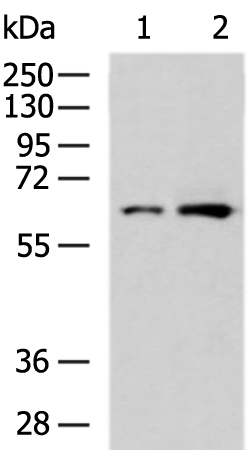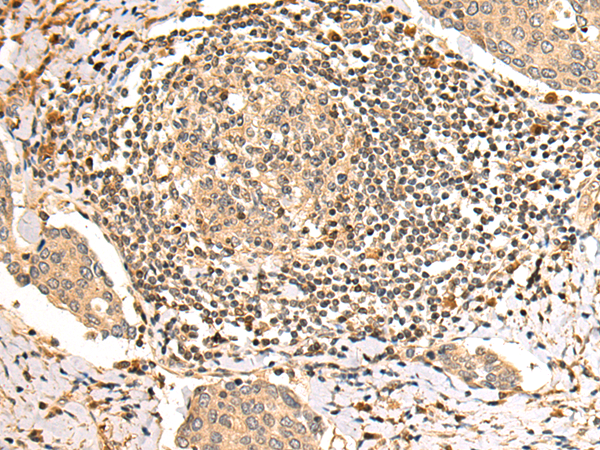

| WB | 咨询技术 | Human,Mouse,Rat |
| IF | 咨询技术 | Human,Mouse,Rat |
| IHC | 1/100-1/300 | Human,Mouse,Rat |
| ICC | 技术咨询 | Human,Mouse,Rat |
| FCM | 咨询技术 | Human,Mouse,Rat |
| Elisa | 1/5000-1/10000 | Human,Mouse,Rat |
| Aliases | CDG1T; GSD14 |
| WB Predicted band size | 61 kDa |
| Host/Isotype | Rabbit IgG |
| Antibody Type | Primary antibody |
| Storage | Store at 4°C short term. Aliquot and store at -20°C long term. Avoid freeze/thaw cycles. |
| Species Reactivity | Human, Mouse, Rat |
| Immunogen | Fusion protein of human PGM1 |
| Formulation | Purified antibody in PBS with 0.05% sodium azide and 50% glycerol. |
+ +
以下是关于PGM1抗体的3篇示例文献(注:内容为示例性概括,具体文献需通过学术数据库验证):
1. **文献名称**:*"Phosphoglucomutase 1 Deficiency: Genetic Basis and Antibody-Based Detection Methods"*
**作者**:Wongkittichoteen A, et al.
**摘要**:探讨PGM1缺乏症患者的基因突变与蛋白表达异常,开发基于PGM1抗体的Western blot和ELISA方法用于临床诊断,验证抗体在检测患者样本中的特异性。
2. **文献名称**:*"PGM1 as a Biomarker in Hepatocellular Carcinoma: Role of Monoclonal Antibodies in Tumor Metabolism Studies"*
**作者**:Stincone A, et al.
**摘要**:研究PGM1在肝癌代谢重编程中的作用,利用特异性抗体通过免疫组化分析肿瘤组织PGM1表达水平,发现其高表达与患者预后不良相关。
3. **文献名称**:*"Autoantibodies Against PGM1 in Idiopathic Inflammatory Myopathies: Diagnostic Implications"*
**作者**:Chinoy H, et al.
**摘要**:报道在皮肌炎患者血清中发现PGM1自身抗体,通过免疫沉淀和蛋白质印迹法验证抗体的存在,提示其可能作为新型生物标志物用于疾病分型。
**建议**:以上为示例性内容,实际文献需通过PubMed或Web of Science以“PGM1 antibody”“phosphoglucomutase 1 autoantibody”等关键词检索获取。
**Background of PGM1 Antibody**
Phosphoglucomutase 1 (PGM1) is a key enzyme in glucose metabolism, catalyzing the interconversion of glucose-1-phosphate and glucose-6-phosphate, a critical step in glycogenolysis and glycogenesis. PGM1 plays a vital role in energy homeostasis, linking glycogen metabolism with glycolysis and gluconeogenesis. Dysregulation of PGM1 has been implicated in metabolic disorders, including type 2 diabetes, and certain cancers, where altered glucose metabolism supports tumor growth.
PGM1 antibodies are essential tools for studying the enzyme’s expression, localization, and function in various tissues. These antibodies are widely used in techniques like Western blotting, immunohistochemistry (IHC), and immunofluorescence (IF) to detect PGM1 in biological samples. Research utilizing PGM1 antibodies has revealed its involvement in congenital disorders of glycosylation (CDG), particularly PGM1 deficiency, a rare autosomal recessive condition characterized by hypoglycemia, liver dysfunction, and skeletal muscle abnormalities.
Monoclonal and polyclonal PGM1 antibodies, often raised in rabbits or mice, target specific epitopes of the enzyme. Recent studies highlight PGM1’s potential as a biomarker in cancer prognosis, given its overexpression in malignancies like hepatocellular carcinoma. Additionally, PGM1 antibodies aid in elucidating mechanisms of metabolic adaptation in diseases, offering insights for therapeutic targeting. Ongoing research continues to explore PGM1’s broader roles in cellular signaling and disease pathology.
×